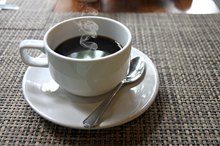Calming Effects of Caffeine
Caffeine is best known as a stimulating drug that helps you stay awake and focuses your brain if you need to concentrate on a task. This chemical also has calming effects because of the way it affects your brain. Such effects are not as noticeable as the stimulation and energy boost, but they do play a role in caffeine's addictiveness.
Caffeine and Dopamine
Dopamine is a neurotransmitter that stimulates pleasant feelings. This chemical works on the brain to make you feel good when something positive happens to you or if you are content from a big meal, Alice Park of Time Health reports. Several drugs artificially cause this effect, including cocaine, amphetamines and caffeine. The dopamine adds a calm, happy feeling to caffeine's stimulating effects.
- Dopamine is a neurotransmitter that stimulates pleasant feelings.
- The dopamine adds a calm, happy feeling to caffeine's stimulating effects.
Psychological Effects
Psychedelic Effects of Morning Glory Seeds
Learn More
Caffeine calms you psychologically when you use it to relieve a particular stressor. For example, you might be worried about a big test at school or finishing an important work assignment because you are sleepy. Taking caffeinated pills or an energy drink, or even drinking several cups of coffee, can calm you down even though it also wakes you up because you feel more confident that you can finish the required task.
Addictive Effects
Caffeine's addictive effects cause agitation when you do not take the drug and calm when you finally drink a cup of coffee, grab a cola or cup or tea of use some other caffeinated product. Heavy coffee drinkers and others who consume a lot of caffeine throughout the day often wake up feeling lethargic, irritable and agitated because the drug worked its way out of their systems overnight. These people feel calmer once they have some caffeine because of their bodies' physical dependence on the chemical.
Caffeine Withdrawal
What Causes a Person to Crash After Drinking Caffeine?
Learn More
Caffeine addiction is serious enough to cause withdrawal symptoms that affect you physically and agitate you psychologically. Common effects include headaches, nausea, muscular stiffness and pain, according to Johns Hopkins Medicine. Many caffeine users get flu-like symptoms when they cease using the drug. You also get irritable, sleepy, depressed and have impaired concentration during caffeine withdrawal. You feel mentally calm, and the physical symptoms resolve themselves, once you start consuming caffeine again.
- Caffeine addiction is serious enough to cause withdrawal symptoms that affect you physically and agitate you psychologically.
Considerations
You can beat caffeine addiction and return to a state of calm without the drug if you wait out the withdrawal symptoms. You suffer the most intense effects within 24 to 48 hours of the time you stop using caffeine, Johns Hopkins Medicine advises 3. The withdrawal effects may last for as long as nine days, but they gradually lessen and eventually stop entirely.
Related Articles
References
- The Brain From Top to Bottom: How Drugs Affect Neurotransmitters
- Time Health; Why We Take Risks - It's the Dopamine; Alice Park; December 2008
- Johns Hopkins Medicine; Caffeine Withdrawal Recognized as a Disorder; September 2004
- Bodar V, Chen J, Gaziano JM, Albert C, Djoussé L. Coffee consumption and risk of atrial fibrillation in the Physicians' Health Study. J Am Heart Assoc. 2019;8(15):e011346. doi:10.1161/JAHA.118.011346
- Pohler H. Caffeine intoxication and addiction. J Nurse Pract. 2010;6(1):49-52. doi:10.1016/j.nurpra.2009.08.019
- Farag N, Whitsett T, McKey B, et al. Caffeine and blood pressure response: Sex, age, and hormonal status. J Womens Health (Larchmn). 2010;19(6):1171-1176. doi:10.1089/jwh.2009.1664
- Depression Basics. National Institute of Mental Health. Revised 2016.
- Caffeine: Tips for Breaking the Habit. Cleveland Clinic. Reviewed July 13, 2014.
- Temple JL. Caffeine use in children: What we know, what we have left to learn, and why we should worry, Neurosci Biobehav Rev. 2009;33(6):793-806. doi.org/10.1016/j.neubiorev.2009.01.001
Writer Bio
Based in Kissimmee, Fla., Barb Nefer is a freelance writer with over 20 years of experience. She is a mental health counselor, finance coach and travel agency owner. Her work has appeared in such magazines as "The Writer" and "Grit" and she authored the book, "So You Want to Be a Counselor."








